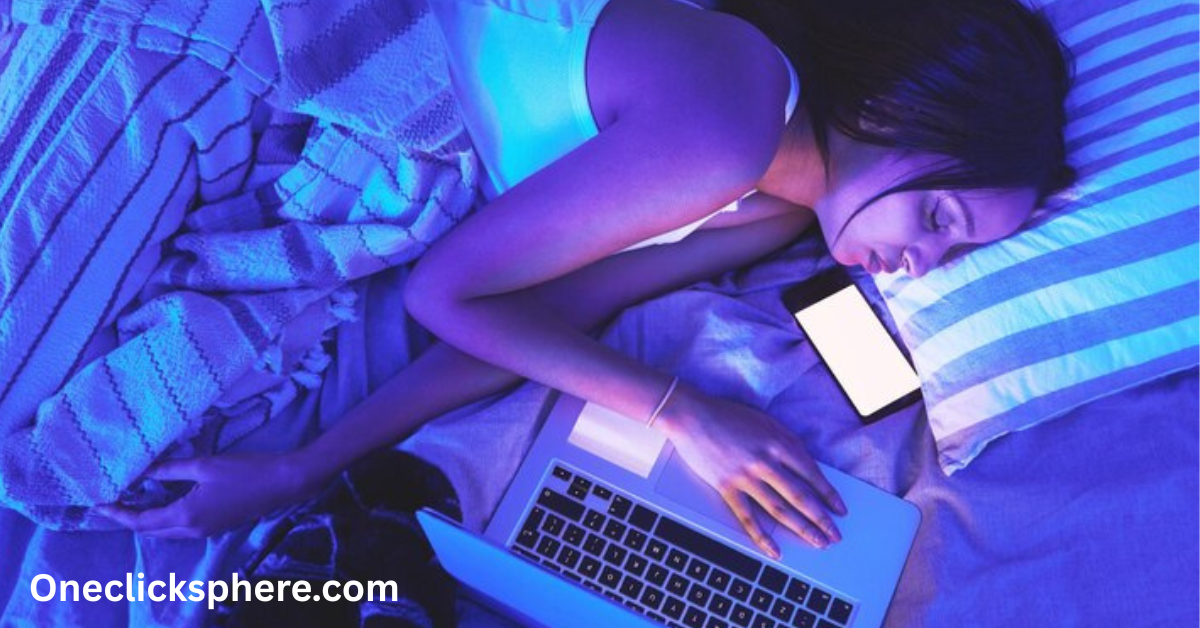Today, life is easier because of electronic devices like smartphones, laptops, and tablets. We can do many things quickly, such as booking train tickets, ordering food, or listening to music. Using phones and laptops at night can make it hard to fall asleep. The bright light from screens and the habit of checking messages keep our minds active when we should be resting. But these devices also have downsides. One big problem is how these 6 Ways Technology Affects Your Sleep Health.
Many people use their phones right before bed. This can lower sleep quality. On average, adults now sleep less than the 7–9 hours recommended by doctors.
To help with this, there’s a helpful plan called the OneFRAMEWORK. It looks at six important points:
- F: How often do we use devices
- R: Light and energy from screens
- A: How devices keep our brains busy
- M: How screen use lowers melatonin (the sleep hormone)
- E: Noise and distractions in the room
- WORK: Mixing work and rest time at home
By thinking about these points, we can use technology better and sleep better, too.
How Technology Affects Sleep
1. Blue Light Disrupts Natural Sleep Rhythms
Most equipment, including tablets, computers, and smartphones, discharge blue light.
This type of light blocks melatonin, the hormone responsible for making the body feel sleepy. Using screens at night confuses the brain and keeps it awake longer.
Key Points
- Delays sleep by reducing melatonin
- Tricks the brain into thinking it’s daytime
- Causes difficulty falling asleep
Solutions
- Use blue light filters or night mode
- Avoid screens 1 hour before bedtime
- Install apps that reduce screen brightness at night
2. Notifications Break Deep Sleep
Buzzes, pings, and vibrations keep the brain active. Even silent alerts can trigger light sleep or cause waking in the middle of the night. Continuous disruptions stop the body from entering deep, restful sleep.
Key Points
- Interrupts REM and deep sleep
- Creates stress and anxiety
- Lowers sleep quality
Solutions
- Use Do Not Disturb mode at night
- Turn off non-essential notifications
- Keep devices outside the bedroom
3. Social Media Creates Mental Overload
Checking social media at night leads to mental stimulation. Seeing news, updates, or arguments can increase stress levels, making it harder to relax and fall asleep. This habit causes a restless mind and delayed sleep.
Key Points
- Increases anxiety before sleep
- Leads to emotional stress
- Keeps the brain overly active
Solutions
- Set app limits on social platforms
- Avoid scrolling in bed
- Change out screen time for relaxing activities like studying.
4. Binge-Watching Delays Bedtime
Streaming services often promote binge-watching. Watching multiple episodes late into the night reduces total sleep time. The habit also shifts sleep schedules and causes next-day tiredness.
Key Points
- Encourages late-night screen time
- Shortens sleep hours
- Affects next-day focus and mood
Solutions
- Set screen time limits for shows
- Watch earlier in the evening
- Use apps that remind you when to stop watching
5. Nighttime Work Increases Stress
Reading work emails or finishing tasks at night creates a stressful mental environment. This work-related screen time keeps the brain focused and alert, which prevents sleep from starting naturally.
Key Points
- Raises cortisol (stress hormone) levels
- Makes it harder to relax
- Delays the start of sleep
Solutions
- Avoid work screens after dinner
- Set clear work boundaries
- Create a relaxing evening routine
6. Smart Technology Can Improve Sleep If Used Correctly
Not all technology is harmful. Some tools support better sleep when used right. White noise machines, smart alarms, and sleep trackers can help improve sleep quality and consistency.
Key Points
- Tracks sleep patterns and progress
- Offers relaxing features like sounds or lights
- Encourages healthier sleep habits
Solutions
- Use low-light or screen-free devices
- Track trends, but focus on how you feel
- Avoid over-reliance on sleep data
Tips to Sleep Better by Reducing Technology Use
Turn Off Screens Early
Decide on a time each night to put your laptop, iPad, or smartphone away.
This gives your brain time to relax. Try to turn off all screens at least one hour before sleep. This helps in preparing your body for sleep.
Use Special Screen Settings
Many devices have a setting that makes the light softer at night. Use this setting in the evening. It can help your brain understand that bedtime is near.
Make a New Night Routine
Replace screen time with calming habits. Read a book, take a warm bath, or stretch quietly. These actions help your mind slow down and prepare for sleep.
Keep Devices Out of the Bedroom
Charge your phone outside the bedroom. Don’t bring your laptop or tablet to bed. This stops you from getting distracted and helps your brain link the bed only with sleep.
Find a Place for Devices
Choose one spot in your home for all electronics. This makes it easier to avoid using them in the bedroom. Keep this area far from where you sleep.
Use a Real Alarm Clock
If you use your phone as an alarm, try switching to a simple alarm clock. This helps you avoid looking at messages or apps late at night or first thing in the morning.
Read Instead of Scrolling
Put a book or magazine next to your bed. When you feel like checking your phone, try reading instead. This is more relaxing and helps you fall asleep faster.
Avoid Work in Bed
Do not bring work into your bedroom. Use the bed only for sleep. This teaches your brain that being in bed means it’s time to rest, not time to think or work.
Try a Sound Machine
If you use your phone for soft music or calming sounds, switch to a white noise machine. This gives the same help without phone distractions.
Talk to People About Your Sleep Time
Let friends and family know you won’t be using your phone at night. This way, they won’t expect replies during bedtime, and you’ll feel less pressure to check your messages.
Use Simple Tricks if You Keep Your Phone
If you need your phone nearby, try some helpful tips. Turn on airplane mode or night mode. Silence your notifications. Don’t check your phone if you wake up in the middle of the night. These small actions can protect your sleep even if your device is close by.
Conclusion
Understanding how digital habits affect sleep is essential for health and well-being. This one framework provides a clear breakdown of the 6 ways technology affects your sleep health. From screen light to smart apps, each factor plays a role in shaping rest patterns. By making small, focused changes, it’s possible to reduce the harm and enjoy better, deeper sleep.

